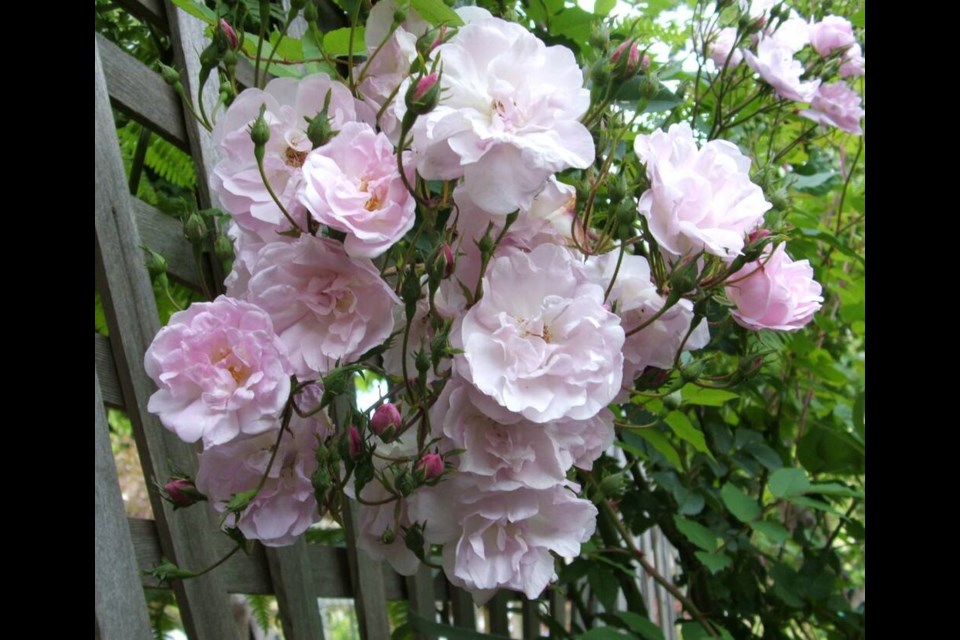In my garden’s early years, as I began shaping its plots in available spaces, I took care to leave groupings of native plants — salal and Oregon grape, sword ferns and red huckleberry among them. As I gradually acquired shrubs, trees and perennials from local garden centres, I also ordered from several small nurseries specializing in unusual plants. None of them remain in business, but their treasures remain.
One of my favourites is the tough yet dainty-looking, well-behaved and long-blooming Narrow Water, a small climbing rose that can be grown as a tall(ish) shrub. It is named for a castle in Northern Ireland where it was discovered. The rose was later introduced, in 1901, in the United Kingdom.
The flowers, borne in large clusters, are semi-double, pale pink and lightly fragrant. The blooms last well into autumn.
In search of a name. Another standout in the garden is a hardy fuchsia that I purchased as “Hellyn’s Choice.” The tiny shrub that arrived in the mail has evolved into an intensely vigorous shrub whose arching stems reach out over the back lawn from a raised bed. It flowers from late spring through mid-autumn. I’ve seen hummingbirds in the blooms in November.
I always knew that Hellyn’s Choice was not the proper name for this fuchsia, and I made sporadic searches over the years to determine its botanical identity — with no luck until recently, when I quite by accident came upon a photo of what looked like my fuchsia. The photo caption gave the name: Fuchsia magellanica var. molinae.
On further investigation, I confirmed the identification, though the University of Washington Botanic Garden uses the name F. magellanica ‘Alba.’ Their website photo clearly shows my fuchsia with its elegantly slim, blush pink flowers hanging delicately against the shrub’s dark green leaves.
This fuchsia, like many others, originates in Chile. Its common name is Maiden’s Blush hardy fuchsia.
A jewel in the wood shed. When I collect pieces of wood from the shed, I check their surfaces for spiders and over-wintering wasps before bringing the wood into the house. On a recent visit to the wood shed, on the cut surface of a piece of wood I spotted a bug I’d never seen before.
It was small, just under two cm, but beautiful. Its slender body was a metallic, almost iridescent, bright green with a coppery-orange lengthwise centre line and edging around the wing covers in the same shiny colour. The underbody had a dark, matallic sheen. It was a small beetle of some sort.
After scrolling through multiple pages of beetle photos, I found my newly discovered creature — the Golden Jewel beetle. Its larvae bore into the wood of dead and fallen trees and the logs of coniferous trees.
The Lone Pine Publishing field guide to Bugs of British Columbia comments that “The colours of the Golden Jewel Beetle are unmatched by any other B.C. species,” adding that this family of beetles is worldwide and in the tropics there are many more beautiful species.
“In southeast Asia many of the most colourful are often made into real jewelry, set in gold with their legs removed, and sold for a high price.”
Otter issues. In an earlier autumn column I passed along a reader’s unusual problem in a waterfront garden: Otters removing all the ripe and ripening large-fruited tomatoes. I could only think of a netting barrier set up to exclude the animals, but another reader wrote with a proven solution.
“I was plagued on the Esquimalt Harbour waterfront with otters coming onto my dock and deck and producing a mess with eating and defecating. Among many deterrents I tried, only one worked.” Toni left a 24-hour talk radio station on, softly, turning it off when he or his neighbours were in the area.
“The one time I forgot to leave the radio on, the otters were back, with their messes.”
Year round harvest course for 2022. Linda Gilkeson, Master Gardener program instructor and author of Backyard Bounty and other publications, will be offering her Year Round Harvest course on Zoom in 2022. The course consists of one class a month for 10 months, January to October, to take food gardeners through the gardening year. For complete information, email [email protected].



